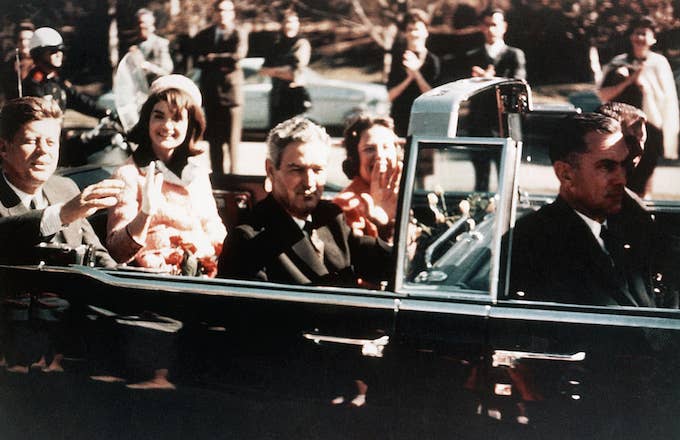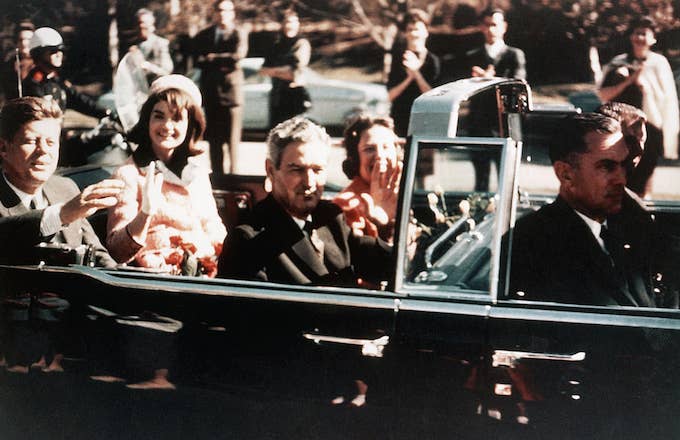
On Thursday, the U.S. government finally declassified thousands of pages of documents related to John F. Kennedy's 1963 assassination. The release of the papers, which you can read here, has been planned for 25 years—which, unsurprisingly, didn't stop Donald Trump from trying to take credit for it. In the end, Trump did hold back some of the documents pending further review.
It will undoubtedly take historians and researchers years to go through all of what was released on Thursday. But in the day or so since everything has been made public, a number of notable, interesting, and just plain bizarre discoveries have been made. So without further ado, here are 5 of the weirdest revelations in the new JFK documents.
The mysterious phone call
The tidbit that has gotten perhaps the most attention is an account of a strange phone call received by a senior reporter at the Cambridge News, an English paper. "The caller said only that the Cambridge News reporter should call the American Embassy in London for some big news and then hung up," reads the memo.
Why is that notable? The timing of the call. It came in on Nov. 22, 1963, at 6:05 p.m local time—25 minutes before JFK was assassinated.
Within hours, the present-day staff of the paper was trying to find out more.
The exploding seashell
The CIA has had any number of wild plots over the years. But this document dump reveals some assassination plans that are nutty even by the standards of an agency that loves mind-control experiments.
The Agency made plans to kill Fidel Castro via poisoning his diving suit. If that didn't work, they would try another undersea method. They were going to plant a "spectacular seashell" underwater in hopes that it would catch his attention during a dive. But they would put explosives inside!
Shockingly, that idea was abandoned. "After investigation, it was determined that there was no shell in the Caribbean area large enough to hold a sufficient amount of explosive which was spectacular enough to attract the attention of Castro," one document reads.
The warning about Robert Kennedy's affair with Marilyn Monroe
The tabloids, unsurprisingly, have been all over this one.
A July 1964 letter to intelligence officials told them about the upcoming publication of a book called The Strange Death of Marilyn Monroe by Frank A. Capell. And why did the Feds care so much about that particular tome? Because it was going to make public something the memo said was "well known to her friends and reporters in the Hollywood area," but secret otherwise—that the iconic movie star was having an affair with Robert F. Kennedy.
The book, however, went beyond talking about that rumor into something much darker—that RFK had Monroe killed by "the Communist Conspiracy" after she threatened to expose their relationship. Unsurprisingly, despite alarming the government, the book was basically ignored by the public.
Searching for Kitty
The FBI was working overtime trying to find a stripper named "Kitty" who was alleged to have hung around with Lee Harvey Oswald's assassin Jack Ruby. In early 1964, they hunted all over and found one likely suspect, Kitty Raville. However, she had committed suicide a few months prior.
The "high-priced Hollywood call girl" and the Rat Pack
One document from 1960 deals with a potential informant, Sue Jones. She is bluntly described as "a high-priced Hollywood call girl." Her "close friend," private detective Fred Otash, had recently been convicted of "horse race fixing" (yes, really—you can't make this stuff up).
Otash asked Jones if she had been involved in "sex parties" (again: yes, really) involving JFK, his brother-in-law Peter Lawford, Frank Sinatra, and Sammy Davis, Jr. This all had to do with Confidential magazine attempting to find dirt on Kennedy before that year's election. Sadly for future historians, Jones didn't know nothing about nothing and even turned down a chance to meet JFK while wearing a wire.

